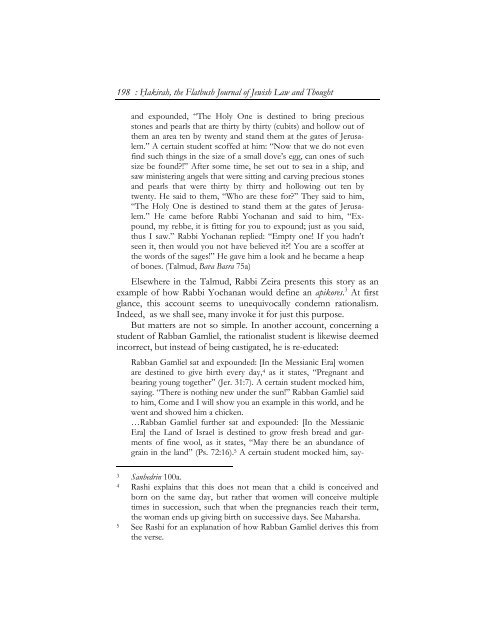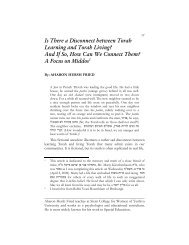Messianic Wonders and Skeptical Rationalists - Hakirah.org
Messianic Wonders and Skeptical Rationalists - Hakirah.org
Messianic Wonders and Skeptical Rationalists - Hakirah.org
Create successful ePaper yourself
Turn your PDF publications into a flip-book with our unique Google optimized e-Paper software.
198 : Hạkirah, the Flatbush Journal of Jewish Law <strong>and</strong> Thought<br />
<strong>and</strong> expounded, “The Holy One is destined to bring precious<br />
stones <strong>and</strong> pearls that are thirty by thirty (cubits) <strong>and</strong> hollow out of<br />
them an area ten by twenty <strong>and</strong> st<strong>and</strong> them at the gates of Jerusalem.”<br />
A certain student scoffed at him: “Now that we do not even<br />
find such things in the size of a small dove’s egg, can ones of such<br />
size be found?!” After some time, he set out to sea in a ship, <strong>and</strong><br />
saw ministering angels that were sitting <strong>and</strong> carving precious stones<br />
<strong>and</strong> pearls that were thirty by thirty <strong>and</strong> hollowing out ten by<br />
twenty. He said to them, “Who are these for?” They said to him,<br />
“The Holy One is destined to st<strong>and</strong> them at the gates of Jerusalem.”<br />
He came before Rabbi Yochanan <strong>and</strong> said to him, “Expound,<br />
my rebbe, it is fitting for you to expound; just as you said,<br />
thus I saw.” Rabbi Yochanan replied: “Empty one! If you hadn’t<br />
seen it, then would you not have believed it?! You are a scoffer at<br />
the words of the sages!” He gave him a look <strong>and</strong> he became a heap<br />
of bones. (Talmud, Bava Basra 75a)<br />
Elsewhere in the Talmud, Rabbi Zeira presents this story as an<br />
example of how Rabbi Yochanan would define an apikores. 3 At first<br />
glance, this account seems to unequivocally condemn rationalism.<br />
Indeed, as we shall see, many invoke it for just this purpose.<br />
But matters are not so simple. In another account, concerning a<br />
student of Rabban Gamliel, the rationalist student is likewise deemed<br />
incorrect, but instead of being castigated, he is re-educated:<br />
Rabban Gamliel sat <strong>and</strong> expounded: [In the <strong>Messianic</strong> Era] women<br />
are destined to give birth every day, 4 as it states, “Pregnant <strong>and</strong><br />
bearing young together” (Jer. 31:7). A certain student mocked him,<br />
saying. “There is nothing new under the sun!” Rabban Gamliel said<br />
to him, Come <strong>and</strong> I will show you an example in this world, <strong>and</strong> he<br />
went <strong>and</strong> showed him a chicken.<br />
…Rabban Gamliel further sat <strong>and</strong> expounded: [In the <strong>Messianic</strong><br />
Era] the L<strong>and</strong> of Israel is destined to grow fresh bread <strong>and</strong> garments<br />
of fine wool, as it states, “May there be an abundance of<br />
grain in the l<strong>and</strong>” (Ps. 72:16). 5 A certain student mocked him, say-<br />
3 Sanhedrin 100a.<br />
4 Rashi explains that this does not mean that a child is conceived <strong>and</strong><br />
born on the same day, but rather that women will conceive multiple<br />
times in succession, such that when the pregnancies reach their term,<br />
the woman ends up giving birth on successive days. See Maharsha.<br />
5 See Rashi for an explanation of how Rabban Gamliel derives this from<br />
the verse.
















